October 2, 2020
Air Date: October 2, 2020
FULL SHOW
SEGMENTS
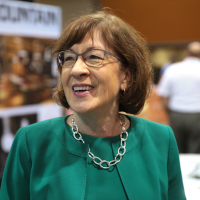
Maine Senate Race and the Environment
View the page for this story
One of the key races in the 2020 elections is for the US senate in Maine, where the environment is consistently rated as a priority issue for voters. Incumbent Senator Susan Collins is known for having a strong environmental record among her Republican colleagues, but many environmental groups focused on the campaign for a more environmentally-friendly Democratic majority in the Senate have switched their support to Democratic challenger Sara Gideon. Host Steve Curwood is joined by Bangor Daily News Politics Editor Michael Shepherd to discuss this contest. (08:58)
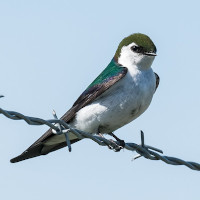
BirdNote®: Swallows on Wires
/ Michael SteinView the page for this story
In the Northern Hemisphere, the fall migration season for birds is upon us as they congregate and get ready to fly south for the winter. As BirdNote®’s Michael Stein reports, for some birds this is also a time for socializing. (02:04)
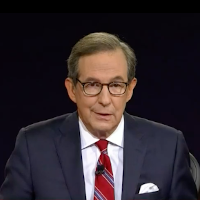
Climate on Chaotic Debate Stage
/ Peter DykstraView the page for this story
Environmental Health News Weekend Editor Peter Dykstra joins Host Steve Curwood to review the September 29th presidential debate where amid the chaos, a question on climate was asked for the first time in a general election debate since 2008. The two discuss the responses from President Trump and former Vice President Biden and celebrate the 50th anniversary of the creation of two vital environmental agencies: the EPA and NOAA. (06:05)
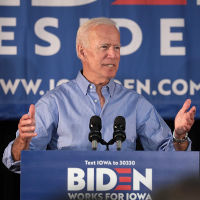
John Kerry Cochairs Biden Climate Plan
View the page for this story
Joe Biden is offering a $2 trillion climate plan as part of his presidential campaign’s “Build Back Better” economic recovery agenda. Former Secretary of State John Kerry, cochair of the Biden Climate Task Force, joins Host Steve Curwood to talk about how the Biden campaign is connecting its climate ambitions with public health crises and the worst economic crisis since the Great Depression. They also discuss Joe Biden’s stances on nuclear energy and fracking, President Trump’s lack of climate leadership, and the urgency of voting with climate in mind this November. (12:49)
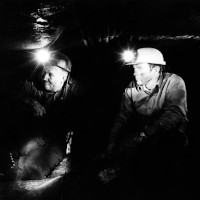
Black Lung and COVID-19
/ Caitlin TanView the page for this story
Former coal miners who suffer from black lung disease are especially vulnerable to COVID-19. Caitlin Tan of West Virginia Public Broadcasting covers how Appalachian miners experiencing the debilitating, terminal condition struggle to get the care and government support they need amid a pandemic. (05:53)
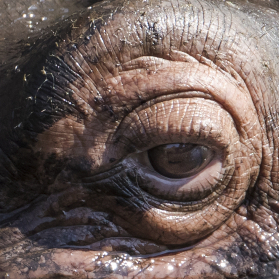
Scylla and Charybdis on the Zambezi River
/ Mark Seth LenderView the page for this story
Living on Earth’s Explorer-in-Residence Mark Seth Lender recounts a hair-raising encounter with hippopotamus and Cape buffalo on the Zambezi River and in Hwange National Park, Zimbabwe. (03:56)
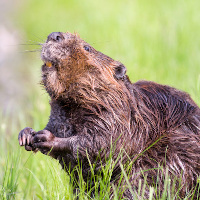
Beavers Return to England
/ Jenni DoeringView the page for this story
UK officials have confirmed that a five-year beaver reintroduction pilot program in England was a success, and the first beavers to live in England for centuries will be allowed to stay. Professor Richard Brazier of the University of Exeter joins Living on Earth’s Jenni Doering to discuss how the beavers are bringing rich biodiversity back to their local riverscape. (06:51)
Show Credits and Funders
Show Transcript
HOST: Steve Curwood
GUESTS: Richard Brazier, John Kerry, Michael Shepherd
REPORTERS: Peter Dykstra, Mark Seth Lender, Michael Stein, Caitlin Tan
[THEME]
CURWOOD: From PRX – this is Living On Earth.
[THEME]
CURWOOD: I’m Steve Curwood.
Former Secretary of State John Kerry on Joe Biden's plan to "build back better" with climate-smart incentives.
KERRY: Building back from COVID-19, and from the position we find ourselves in will be hugely advantaged by building out an energy grid, by doing what we need to do to incentivize the shift to electric, to solar, to wind, to hydrogen.
CURWOOD: Also, for coal miners with black lung disease Covid19 is especially challenging and dangerous.
COLEMAN: With your breathing problems and stuff it's hard to walk around and breathe through the mask. It's like sucking in hot air but I don't have no choice. With the conditions of my lungs and stuff I can't take a chance.
CURWOOD: That and more this week on Living on Earth – Stick Around!
[NEWSBREAK MUSIC: Boards Of Canada “Zoetrope” from “In A Beautiful Place Out In The Country” (Warp Records 2000)]
[THEME]
Maine Senate Race and the Environment
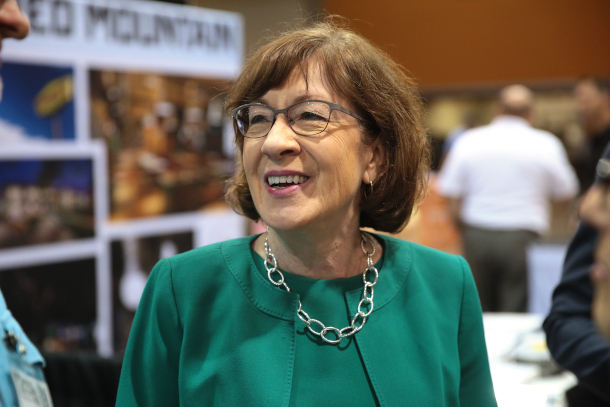
Republican Susan Collins has a lifetime score of 61% according to the League of Conservation Voters, but they have switched their support to Democratic challenger Sara Gideon after endorsing Sen. Collins in 2014. (Photo: Gage Skidmore, Flickr, CC BY-SA 2.0)
CURWOOD: From PRX and the Jennifer and Ted Stanley Studios at the University of Massachusetts Boston, this is Living on Earth. I’m Steve Curwood.
With control of the US Senate hanging in the balance Maine moderate Republican Senator Susan Collins is facing a tough election to keep her seat for a fifth term. She is being challenged by Sara Gideon, the current Democratic Speaker of the house in the Maine legislature. Maine is heavily dependent on a healthy environment for tourism, fisheries, farming, and forestry. For more on how climate change and the environment is influencing the Senate race in Maine I’m joined now by Michael Shepherd, Politics Editor of the Bangor Daily News.
SHEPHERD: Thanks, Steve.
CURWOOD: So Michael, for years, Susan Collins has had a strong environmental record as a Republican. There's been years that the League of Conservation Voters gave her 100 points. More recently, not so high. Why has there been a shift of climate and environmental groups away from Susan Collins in this election cycle? Do you think?
SHEPHERD: Really, I think it's national politics. Steve, we've seen over the years, Susan Collins was an early supporter of, you know, climate science. She was, in 2003 she voted for the Senate's really the first bill to try to reduce emissions. She's been sort of out in front of this issue for a long time. What's happening now, though, I think is these environmental groups are seeing a Democratic candidate in Sara Gideon, who really has a shot at unseating Senator Collins, they just haven't had that in the past. So I think what they're seeing is these judicial nominations that have been really controversial, and they see Sara Gideon is someone who's very reliable on that issue for them. So I think these environmental groups that have backed Collins in the past did that sort of out of a practical nature. Now they have someone they can they can maybe trust a little bit more, regardless of the policy differences, which are slimmer between these two candidates, then you're typically used to seeing between Democrats and Republicans.
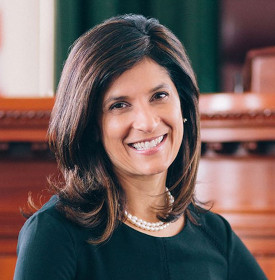
Polls suggest Democratic Sara Gideon has a shot to unseat the four-term Republican Senator from Maine in one of the toughest tests Susan Collins has faced for reelection (Photo: Pebbleroad, Wikimedia Commons, CC BY SA-4.0)
CURWOOD: And now to what extent is the national interest because the Senate is in balance here?
SHEPHERD: Yeah.
CURWOOD: If Susan Collins were to lose, it would put democrats one seat closer to gaining the majority in the Senate.
SHEPHERD: Yeah, it's an amazing race here. We've been fighting this number for a long time, and it's a little higher now. But we've seen $40 million in outside money. And the candidates themselves raised that much by June alone and with much more money coming into the race, this is easily going to go over 100 million dollars, it's going to be the most expensive race in Maine history. So this is clearly on the national radar. It's one of the key seats that Democrats really need to flip the Senate. And it's a place where Republicans have you know, maybe a candidate who can weather the storm a little better than some other incumbents, but she's still underwater here a little bit in a democratic leaning state and you know, that crossover popularity is largely gone.
CURWOOD: So Michael, just lay out in broad strokes for me, how do Susan Collins and her challenger, Sara Gideon, stack up from an environmental perspective?
SHEPHERD: Susan Collins has supported lots of individual policies around climate that most environmental groups would believe in, she's tried to incentivize clean energy development. You know, she's been there on emissions reductions and things like that. Sarah Gideon has outlined kind of a consensus democratic platform on climate, it involves larger goals like getting to zero emissions by 2050, across the country. So she's relatively safe on the issue. She hasn't stuck her neck out to support the green New Deal. She's sort of praised it for the energy that it's giving to, you know, sort of the climate movement, but she's not ready to go there. I think Susan Collins is more likely to offer sort of more piecemeal concrete steps Sara Gideon is looking to sort of drive the conversation going forward.
CURWOOD: So Mike, talk to me about some of the key environmental issues that Mainers vote on. I know you've done some polling, I think on Mainer attitudes towards the climate crisis. How do those breakdown?
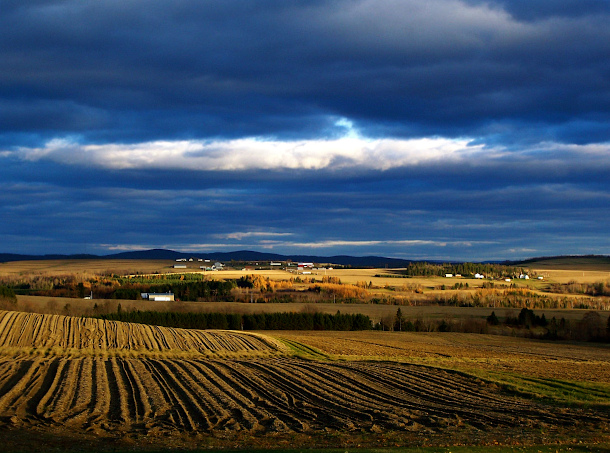
Aroostook County, Maine’s agricultural hub, is facing one of the worst droughts in the past 130 years this summer, and some, including Democratic US Senate candidate Sara Gideon, have linked the drought to global climate change. (Photo: Richard Robles, Flickr, CC BY-NC-ND 2.0)
SHEPHERD: Yeah, it's pretty interesting. Maine is concerned about climate change, for the most part, and we see it in our lobster industry. There's a concern that, you know, lobsters are moving North, there's a concern about erosion in some of our seaside towns, there's a lot of worry about the issue generally. We polled Mainers in August, and we found that about 77% of people were either somewhat or very concerned about it. It actually breaks down in ways that are a little surprising. You see that when you say how much is Maine impacted by climate change? There are about Jeez, it's almost universal among Democrats and Republicans, about 40% of Republicans say that Maine has either been impacted somewhat or a great deal by climate change. So it's something that it certainly breaks down along partisan lines, but it's not something that is as partisan as you may think. And I think that's sort of a testament to the universal appreciation for the environment that we have here in Maine.
CURWOOD: Tease apart for me for a moment the differences between Sarah Gideon and Susan Collins when it comes to their voting records on environmental issues. Yeah, I would say that Sara Gideon has championed pro-solar bills in the legislature. She has supported these these sort of long term goals that Governor Mills has gotten behind and are sort of driving the state level climate change conversation. You look at Susan Collins' record and if you're an environmentalist, there are may be things that you're concerned about and things that you may support. For instance, she voted for the 2017 tax bill after trying to get a provision out that opened ANWR the Alaskan wildlife refuge to oil and gas drilling. She tried to get it out on an earlier vote and then ended up voting for the version that left it in. So that was that something controversial that people are pointing to but she's also supported a lot of one-off measures that would have addressed climate change in more targeted ways.
Maine also faces climate threats in the form of sea level rise and eroding shorelines. (Photo: Isaac Merson)
CURWOOD: So one of the things that's really interesting about this race, Mike is that on the one hand, you have Susan Collins as a Republican back in 2010, offering a plan with Maria Cantwell, the democrat from Washington state for what was known as a cap and dividend way to address carbon that virtually all the money collected in the form of a fee on carbon use would get rebated to consumers. And then in Maine, in the house, you have Sarah Gideon proposing essentially a carbon tax. So both of these folks have really stuck their necks out at times to say, let's put a price on carbon. Why and how should that matter to voters? Do you think?
SHEPHERD: I think it shows it shows the differences between them to a certain degree, the carbon tax was something that Governor Janet Mills, who's you know, who's a Democrat, and she's environmentally focused, that's something she was she didn't want to put on the table here. So it was very quickly killed in the Maine legislature and was just a partisan bill and really didn't have much of a prayer from the beginning. The Collins example you cited is pretty interesting in that it also didn't go anywhere. But it was a pretty interesting design, where 75% of the revenue collected would have gone to consumers in a direct rebate from these carbon credit sales that producers would pay. And the rest of it would go to clean energy development. So I've actually talked to experts who said the Collins proposal is probably more progressive and effective, but they're not running on these plans right now. And Collins is campaigning against Gideon on the carbon tax even though these two proposals would have done at the end of the day, similar things they would have priced carbon in different ways, certainly, but similar designs. So these are things that they're both running away from them to a certain degree, Susan Collins isn't saying whether she'd support that design that she supported back then and Sarah Gideon's saying, "Well, I don't support any carbon tax on the federal level." So it's not something they're racing toward in this election, but it's going to be something up here, it's a cold state, people are still heavily reliant on heating oil. It's something that Republicans have used against past candidates with varying degrees of success, of course, but you know, it's gonna be something people are watching up here for sure how that would fall in consumers.
CURWOOD: The National situation with the competition between former Vice President Biden and present President, Mr. Trump seems to be the big focus here. How did these two candidates, how do voters resonate with them on the national ticket situation.
Climate change is an issue Mainers care about, even if it doesn’t directly drive their vote. The Gulf of Maine is one of the fastest warming bodies of water on the planet, which has serious implications for the lobster fishery and tourism industry. (Photo: Isaac Merson)
SHEPHERD: Climate itself is not the biggest issue in this race for the voters. It certainly is for, you know, perhaps Democratic voters who have ranked this about as high as health care in some of the surveys that we've done of our readers, but it's sort of baked into all these really controversial elements that made this a campaign. 10 years ago, when I started doing this, you know, I wouldn't have thought Senator Collins would be in a reelection fight here in 2020. But here she is, this is the person who has, you know, polled at 70% approval ratings in the past. She's, She's been very popular for a long time. So what has turned this into a race is was the Kavanaugh vote in 2018. And now we have another Supreme Court nomination fight on our hands. And that's another, that's a whole different issue. But I think you see the climate issue sort of being wrapped in to that larger judicial nomination issue. And that's really, that's really what the momentum in this race has sort of, has sort of revolved around.
CURWOOD: Michael Sheppard is the politics editor of the bank or Daily News, Bangor, Maine. Thanks so much for taking the time with us today.
SHEPHERD: Thank you, Steve.
Related links:
- Bangor Daily News | “How Maine’s US Senate Candidates Differ on Climate Change and the Environment”
- Inside Climate News | “Senate 2020: In Maine, Collins’ Loyalty to Trump Has Dissolved Climate Activists’ Support”
- Bangor Daily News | “Maine Voters' Level of Concern About Climate Change Breaks Down by Party Lines”
- Bangor Daily News | “Sara Gideon ‘Climate Agenda’ Endorses Making US Carbon Neutral by 2050”
- Read what Susan Collins has to say about environmental issues
- Click here for Sara Gideon’s plan
[BIRDNOTE THEME]
BirdNote®: Swallows on Wires
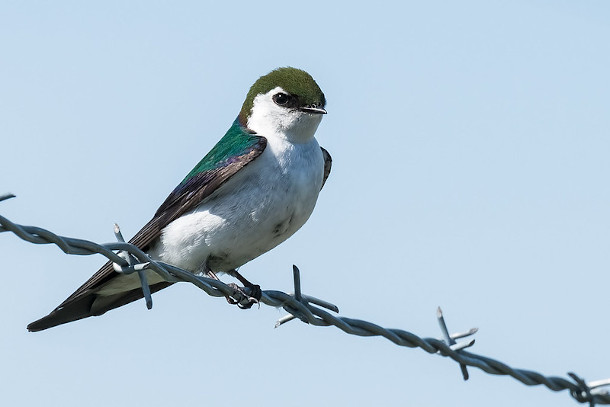
Violet-green Swallows often gather on electrical wires to socialize before their migratory journey. (Photo: mjeedelbr, Creative Commons)
CURWOOD: In this half of the word, the fall migration season for birds is fully upon us as they congregate and get ready to fly south for the winter. As BirdNote’s Michael Stein reports for some birds this is also a time for socializing.
BirdNote®
Swallows on Wires
Written by Frances Wood
[Chatter of Violet-green Swallows]
Once nesting season ends, these Violet-green Swallows seem to know it’s time to party! They usually nest as single pairs in cavities or nesting boxes in the Western United States. But now, they gather on electrical wires by the dozens, and chatter away as part of their pre-migration socializing. [Repeat chattering of Violet-green Swallows]
They’re not alone. Tree Swallows, both adults and juveniles, often join the Violet-greens, before they all begin their southbound migration to Mexico and Central America. Cliff Swallows may gather in the same fashion. And Barn Swallows — not just in North America, but across Europe and into China — party, too.
[Chatter of Barn Swallows]
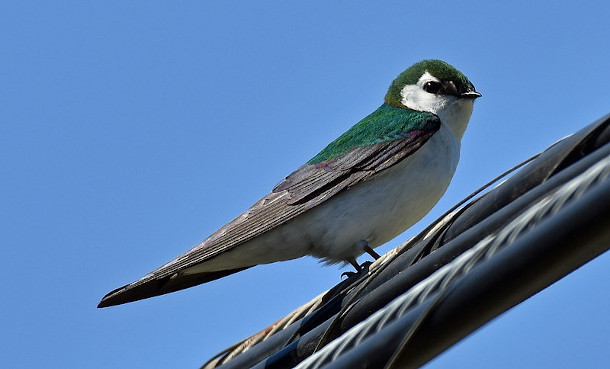
Swallows, like the Violet-green above, migrate south to Mexico and Central America. (Photo: Stephanie Nixon, Creative Commons)
Birds flock for protection — the more eyes watching, the greater the chance of noticing predators. Also, birds flock to share information about where to find food.
Migrating by day, swallows forage for insects as they move south. Next spring when they return, you won’t see the swallows sitting on telephone wires. Then it’s all business, as they begin selecting their sites and building their nests. They save their socializing for the fall.
[Chatter of Barn Swallows]
###
Chatter of the Violet-green Swallows provided by The Macaulay Library of Natural Sounds at the Cornell Lab of Ornithology, Ithaca, New York. Recorded by G.A. Keller; Barn Swallow recorded by see BARS -02
Ambient swallow sounds recorded by C. Peterson
Producer: John Kessler
Executive Producer: Chris Peterson
© 2010 Tune In to Nature.org Sept. 2010 / Sept 2015 / 2020
ID#090805VSGSKPLU swallow-05-2010-09-03
https://www.birdnote.org/listen/shows/swallows-wires
CURWOOD: For photos migrate over to the Living on Earth website, LOE dot org
Related links:
- Find this tory on the BirdNote® Website
- More about the Violet-green Swallow from the Audubon Guide to North American Birds
- Learn more at All About Birds
[MUSIC: John Dodge, “Toro, Toro” on Greetings From Bridgetown, by John Dodge, Path of Stone Recordings]
CURWOOD: Coming up: We’ll take a look at the recent presidential debate and the question of climate change. That’s just ahead on Living on Earth.
ANNOUNCER: Support for Living on Earth comes from Sailors for the Sea and Oceana. Helping boaters race clean, sail green and protect the seas they love. More information at sailors for the sea dot org.
[CUTAWAY MUSIC: John Dodge, “Toro, Toro” on Greetings From Bridgetown, by John Dodge, Path of Stone Recordings]
Climate on Chaotic Debate Stage
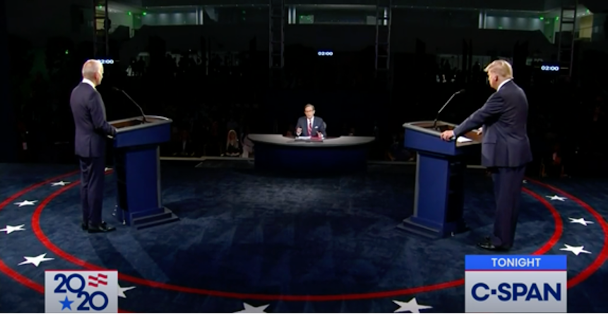
Former Vice President Joe Biden (D) (left) and President Donald Trump (R) (right) participated in the first Presidential debate of 2020 on September 29. (Photo: Courtesy of C-SPAN)
CURWOOD: It's Living on Earth. I'm Steve Curwood. Time now to talk to Peter Dykstra. He's on the line from Atlanta, Georgia, and he's an editor with Environmental Health News, that's EHN.org and Daily.Climate.org. And, Peter, how you doing? And let's talk about that debate between Vice President Biden and President Trump the other day.
DYKSTRA: Well, yeah, about 100 million people tuned in, including myself. And I kind of thought I was wasting my time, listening for a full hour to interruptions and crosstalk largely from the president, but certainly from both men. And about an hour in, the moderator Chris Wallace of Fox News, not only asked a question that the debaters answered, but he asked a question about climate change.
CURWOOD: Been a while since we've heard that in presidential debates.
DYKSTRA: 12 years to be exact, three campaigns ago, with the late Senator John McCain, and then-Senator Barack Obama running against each other. Since then, not a word in the final presidential debates about climate. And all of a sudden, out of the blue, a moderator asks a reasonable question about climate.
CURWOOD: Let's take a listen, now, first to Chris Wallace's question to the President. He tied climate with the fires in California.
WALLACE: Do you believe that human pollution, gas, greenhouse gas emissions contributes to the global warming of this planet?
TRUMP: I think a lot of things do. But I think to an extent, yes, I think to an extent, yes. But I also think we have to do better management of our forests.
CURWOOD: And then the moderator turn to former Vice President, Joe Biden,
WALLACE: You propose $2 trillion in green jobs, you talk about new limits on fracking, ending the use of fossil fuels to generate electricity by 2035. And zero net emission of greenhouse gases by 2050. The President says a lot of these things would tank the economy and cost millions of jobs.
BIDEN: He's absolutely wrong, number one. Number two, if in fact, when during our administration, the Recovery Act, I was able to, I was in charge, able to bring down the cost of renewable energy to cheaper than or as cheap as coal and gas and oil.
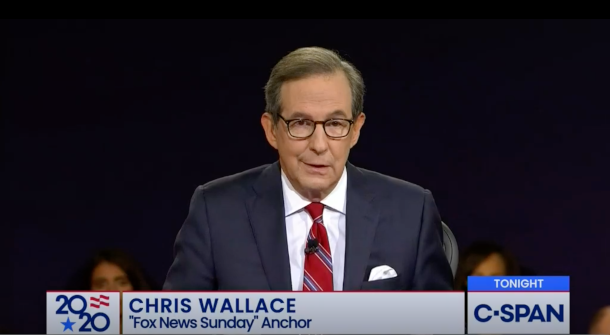
Fox News anchor and Moderator Chris Wallace surprised participants by asking a question about climate change, which was not on the list of circulated topics and which had not been asked on the debate stage for the major Presidential nominees since 2008. (Photo: Courtesy of C-SPAN)
CURWOOD: It appeared to me and I don't know what you think, Peter, but it appeared to me that neither candidate had actually prepared to answer such a question.
DYKSTRA: Oh, no, particularly the president is not a guy who's known for doing his homework on things. And this topic, climate and the environment was not one that was listed on Chris Wallace's chosen topics for the first debate. We weren't sure if they were going to be mentioned at all, in any of the three scheduled debates, but certainly not this one.
CURWOOD: So let's talk about the actual answers that these two candidates gave. What did you make of Mr. Trump's response?
DYKSTRA: Well, the President gave a number that was way out in space of $100 trillion.
TRUMP: Not 2 billion or 20 billion, as you said, it's $100 trillion.
DYKSTRA: I immediately harkened back to Dr. Evil in Austin Powers 3, with similar numbers about a ransom money to not destroy the Earth.
CURWOOD: Wait, that's exactly the line that the President used.
DYKSTRA: That's what the president used. And he was talking about a Democratic Party plan, one that Joe Biden, to begin with, was nowhere near endorsing in the first place. Talking about the Green New Deal put forward by progressives in the House and Senate on the Democratic side.
CURWOOD: Now, how did you rate what former Vice President Biden said?
DYKSTRA: He first of all, cast some distance between the Green New Deal plan and his own, which would be a lot less costly, and according to Biden, would generate jobs and generate new portions of our economy that would more than make up for the cost, in addition to making a great impact on the US impact of climate change.
CURWOOD: What did you make of Biden, not really criticizing President Trump on the climate and especially some of his appointees related to climate protection?
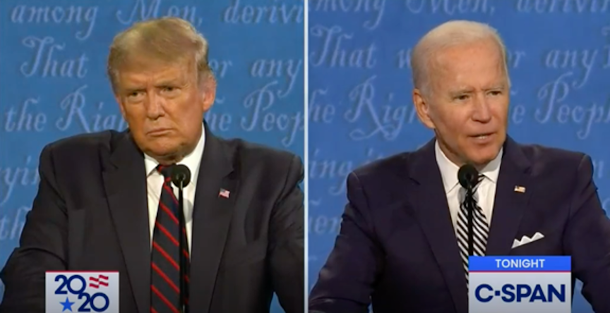
President Trump queried Vice President Biden about The Green New Deal put forth by the progressive wing of the Democratic party, but not endorsed by Joe Biden. (Photo: Courtesy of C-SPAN)
DYKSTRA: Well, there were things within the Biden plan that don't meet some of the farther reaching things on the progressive hands of the party. But they go way beyond the nearly nothing that's been proposed on the Republican side, from President Trump and others, including his heads of EPA, and the Interior Department, who are former lobbyists, respectively, for the coal industry, and the oil industry, something that if he were better prepared, Joe Biden would have made some hay by pointing out.
CURWOOD: Peter, I came away wondering if somebody wasn't paying a lot of attention to climate change, and they were among the hundred million or so Americans that perhaps tuned in to this, that they didn't really get much of an education about climate in this discussion.
DYKSTRA: No, it's still not an issue that is in vogue, not among the Washington Press Corps. One that doesn't seem to have sunk in with either political party, which to me is a shame because not only is it a vital issue, but it's one where you can find the greatest disparity between what the republicans are looking for and what the democrats say they're looking for.
CURWOOD: Well, thanks, Peter. Usually, you know, we take a moment to look back in history. What would you like to point out today?
DYKSTRA: Yeah, two very significant things that happened a day apart. 50 years ago, on October 2nd, the Environmental Protection Agency came into being and a day later on October 3 1970, NOAA, the National Oceanic and Atmospheric Administration came into being. The two agencies that have arguably the most substantial impact on our earth, our climate, and our oceans.
CURWOOD: Thanks, Peter. Peter Dykstra is an editor with Environmental Health News, that's EHN.org and DailyClimate.org. We'll talk again real soon.
DYKSTRA: All right, Steve, and happy anniversary to EPA and NOAA.
CURWOOD: And there's more on these stories at the living on earth website, LOE.org.
Related link:
Watch the First Presidential Debate of 2020
[MUSIC: Igor Presnayakov, “The Entertainer” released on Youtube, by Scott Joplin/arr.Igor Presnayakov]
John Kerry Cochairs Biden Climate Plan
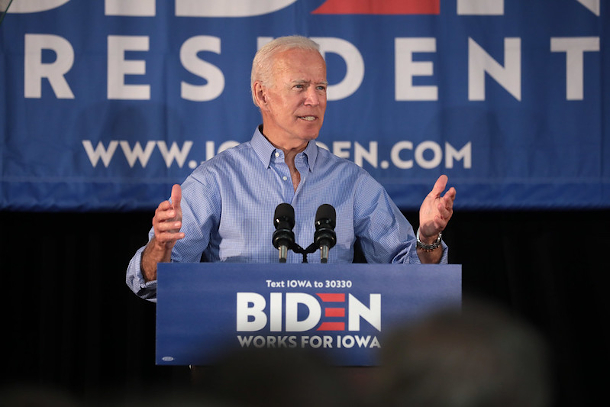
Democratic Presidential nominee Joe Biden speaking with Iowa voters. (Photo: Gage Skidmore, Flickr, CC BY-SA 2.0)
CURWOOD: During this presidential campaign we’ve invited Joe Biden and Donald Trump to come on the show or send a surrogate to discuss their positions on climate change. The Trump campaign has yet to respond to repeated requests but John Kerry, former Secretary of state and himself a democratic nominee for president in 2004 joins us now on behalf of the Biden campaign. Along with New York democratic congresswoman Alexandria Ocasio-Cortez, Secretary Kerry cochaired the Biden-Sanders climate unity task force. This task force crafted a $2 trillion climate plan for Biden which aims to achieve a 100% clean energy economy and net-zero emissions no later than mid-century. Welcome back to Living on Earth, Secretary Kerry!
KERRY: Happy to be with you. Thanks for having me.
CURWOOD: Secretary Kerry, how important do you consider Joe Biden's $2 trillion climate change plan is to the campaign as a whole?
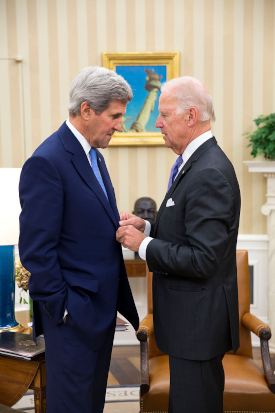
Former Vice President Joe Biden speaking with Secretary of State John Kerry in the Oval Office in October 2014. (Photo: Pete Souza, Official White House Photo)
KERRY: Critical. Absolutely critical because when he is elected, he is going to be facing the biggest economic crisis we've had since Franklin Roosevelt in 1932; I think the Vice President knows that. So building back from COVID-19, and from the position we find ourselves in will be hugely advantaged by building out a energy grid, by doing what we need to do to incentivize the shift to electric, to solar, to wind, to hydrogen. There are huge options available to us that will kick the economy into gear. And the Vice President is deadly serious about getting government to focus on this, but he doesn't view it as the whole solution. The private sector has got to step up; innovation, development, research, infrastructure, those are the key elements. And they happen to be the key elements of recovery, too.
CURWOOD: How excited are you about this? You've been concerned about the climate for decades, literally. How does the, the Biden plan compare to your vision of what you think needs to be done?
KERRY: I think it's the best, detailed, climate plan, climate crisis agenda that has been put forward by any Presidential candidate to date. And I'm extremely excited about it, because I see in it leadership restored for America on an international basis, I see in it our dealing with a whole bunch of Americans who've been on the wrong end of environmental decisions for a long period of time. You look at the problem in the Bronx, for instance, of environmentally induced asthma. The biggest cause of children being hospitalized in America in the summer, is environmentally induced asthma. And part of it is because diesel trucks get routed through communities that don't have the political power to resist; more often than not, minority communities. And so he'll be addressing a whole group of concerns for the average citizen in our country that can be addressed through a combined economic government--private sector partnership. I mean, Joe Biden is talking not just about $2 trillion for infrastructure development, but he's going to make sure we have carbon free power by the year 2035. That's an ambitious but achievable target. And he's going to work with the power companies, utilities and others to achieve that. He is going to have 500 million solar panels that are going to be deployed during the course of five years. Transition of buses, from internal combustion engine to electric. I mean, there are many, many different things we can do. And nobody, none of your listeners, I hope, will sit there and say, Well, wait a minute, that, that's, that's going to hurt the economy, that's going to cost me my job. No! No, no, it's not! It's going to, in fact, lower the price of goods over time, it's going to provide tens of millions of jobs in our country alone. And it is going to provide the ability to be able to have better quality of life because there'll be less particulates in the air, less emissions -- which are pollution. Emissions is too nice a word for pollution. People don't want to breathe dirty air and drink, you know, polluted water. And the reality is that that's what we've been doing for years because we haven't been paying attention.
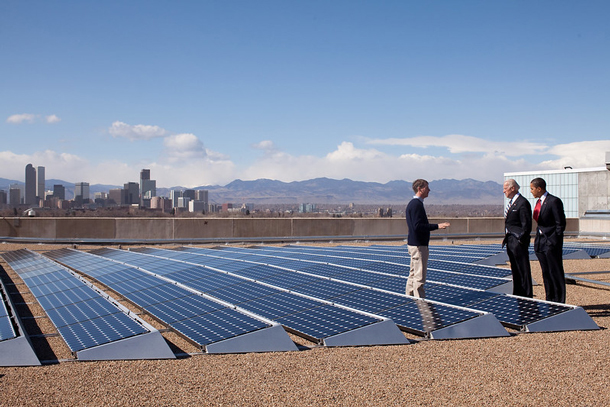
Former President Barack Obama and Vice President Joe Biden discuss solar energy in Denver, Colorado. Biden calls for installing 500 million solar panels within five years. (Photo: Pete Souza, Official White House Photo)
CURWOOD: Right now, I think it's fair to say that a lot of environmental activists are very concerned about the general election, want to see Vice President Biden elected. But the day after he takes office, they're going to look at your climate plan, which has fracking, nuclear power, carbon capture and storage, things that some environmental activists have said over the years are steps backwards instead of forwards.
KERRY: Steve, it leaves the possibility of nuclear power, it doesn't have nuclear power, it just doesn't eliminate it. And if the next generation of modular power plants can prove they are economical, and they solve the problems of meltdown and waste, they may earn themselves a place at the table. What Joe is doing is not eliminating automatically things, because it is zero emissions. If somebody comes up with a way of doing it safe, sound, deliverable, priced right, I think a lot of people would embrace it. We have 20% of our power today in America is nuclear; 70% of France's power is nuclear. So I think it's a question of not eliminating. So his first choice is solar, wind, renewables, alternative, move in a clean direction. Now on the fracking, what he has said is, on existing fracking, that is in private land, he's not going to interfere with the already existing levels, partly because we need the natural gas as a transition fuel as we move into the new technologies. And we can't just cut it off today or tomorrow, and I think reasonable people understand that. So we have to have this transition period, but we have to do it fast enough that we're not cutting our throats while we're in the sort of delay period, we got to move rapidly. That's what Joe Biden understands.
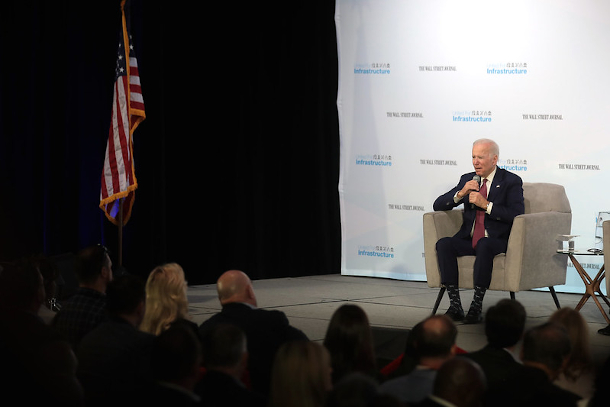
Joe Biden discussed his clean energy ideas at the Moving America Forward Forum on infrastructure in Las Vegas, Nevada in February 2020. (Photo: Gage Skidmore, Flickr, CC BY-SA 2.0)
CURWOOD: But what about more infrastructure for, for natural gas, for fracking?
KERRY: So that's dangerous. I'm not for building up, I personally would, would not want to see us build a whole lot of new infrastructure. Because then as you make the transition, the pressures will come, as they automatically do, politically, "hey, you know, we can't transition our jobs, etc," number one. And number two, you'll have what you call stranded assets, which the economy doesn't want to do, I mean you want to try to minimize that exposure. So we're doing it, but people need to embrace the possibilities of transitioning and providing many more new jobs, better jobs, that actually help us solve this crisis.
CURWOOD: To what extent does the Biden climate plan look at both forestry here in the United States, but perhaps more importantly, at forests around the world as a way to cope with the climate emergency?
KERRY: The reality is the Biden plan is focused on agriculture, regenerative agriculture, it's focused on building out what we call sinks. Sinks are those things or places where carbon dioxide gets consumed. The ocean is a sink, carbon dioxide, maybe 50, 60% of our heat and carbon goes into the ocean. It's a great storage center. Well, so is the rainforest in Amazon. And Joe Biden has called for practices by other countries that are going to respect the international goals here of sustainability, and sustainability requires us to protect those forests. But his largest priority will remain getting all nations, particularly developed nations, back to and beyond the Paris Agreement. I had the privilege of leading our negotiations in Paris, and I can tell you that what helped make that happen was bringing China to the table, working with India, working with Australia, Saudi Arabia, Brazil, other countries. We exercised, I think, strong diplomacy, strong leadership. In the end, 196 countries signed on to that agreement. Only Donald Trump, he's the only President in the whole world who has pulled out of the Paris Agreement. And he has done so without any scientific rationale. He's done so, in fact, lying to the American people about the burden that it put on America, when in fact, the program that we adopted was written by Americans, for Americans, including Fortune 500 companies, Big Oil, they were all at the table. The largest companies in America helped to write our plan. And it does not place a burden on America, it places before us a huge opportunity.
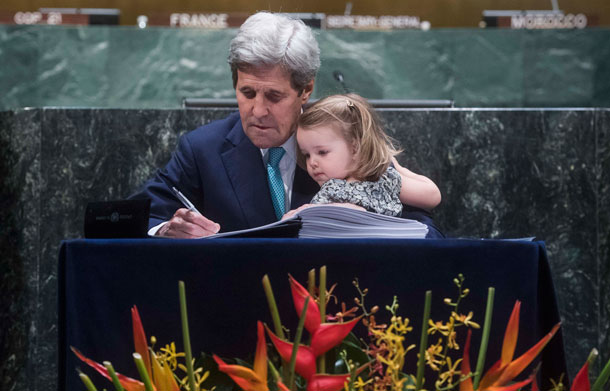
On Earth Day, April 22, 2016, then US Secretary of State John Kerry signed the Paris Agreement at the United Nations as his granddaughter Isabelle looked on. Just over a year later, President Trump announced he was withdrawing the US from the landmark climate change agreement. (Photo: UN Photo/Amanda Voisard, Flickr, CC BY-NC-ND 2.0)
CURWOOD: The other day, China announced a goal of going carbon neutral by 2060. How could a new administration rebuild the US-China relationship to lead the world on setting strong climate targets? Because, 2060 is necessary, but not sufficient, I would think.
KERRY: I couldn't agree with you more. I welcome the fact that they've taken awareness of it and that they've targeted 2060. But that doesn't work. It doesn't work for the rest of the world. China is about to bring online, some 21 Gigatons of coal-fired power. That doesn't work for us, doesn't work for the whole world. It may work for China in the short term, but it's not even going to work for China in the long term. We worked very effectively with China during the Obama-Biden administration. And Joe Biden has a very strong relationship with President Xi. He knows how to be tough, but he also knows how to get things done. Unlike President Trump, who hasn't gotten anything done with them, except to raise the decibels and wind up making food products much more expensive for American farmers and making those, those farmers' lives quite difficult over the last three years.
CURWOOD: Let me ask you about a coalition that you called World War Zero, just a couple of months before the coronavirus pandemic hit; remind me of World War Zero's mission and how the pandemic has now reshaped your on the ground work.
KERRY: World War Zero is a group that we brought together on a bipartisan basis. I was working with former Republican Governor Arnold Schwarzenegger, with former Governor Christie Todd Whitman of New Jersey, with former defense secretaries, Senators Bill Cohen and Chuck Hagel. A whole bunch of people came together saying, we've got to talk differently about climate change, crisis. We can't be polarized. And we can't let actions we know we need to take be prevented because we can't build a majority for this. So we came together with a view to trying to help people realize, as unlikely allies -- I mean, Arnold Schwarzenegger, John Kerry, these folks, they're unlikely allies. But they are allies on this climate crisis. And they came together to urge people to vote. We're not telling people how but we're trying to urge people that climate crisis is worth finding the person that you think is going to do something about it. And we're asking you to vote for that person. So it's World War Zero -- it's World, because the whole world has to be at the table involved in this. It's War, because, unfortunately, some people have decided to declare war on science, war on facts, war on evidence. And we're going to push back against that. And it's Zero, because zero is the target figure we must reach by 2050, we have to have a net zero carbon economy, and frankly, I think sooner than that. And we've had many, many, many digital conversations with people, we've had incredible learning sessions where we've had different scientists, we had a glaciologist the other day talking about what's happening to Greenland and Antarctica, and we're trying to help inform people, so they can go out and make an informed vote. But the key, the key is this: in 2016, when Trump was elected, only 55.6% of eligible Americans decided to go vote. That's horrible in a democracy. And the truth is that of the young people, 18 to 25, only 19% went to vote. So if we're going to win our future, if we're going to make our democracy work, you got to vote. Vote climate, and vote for people, whatever party or walk of life they're in, who are going to help us address this crisis.
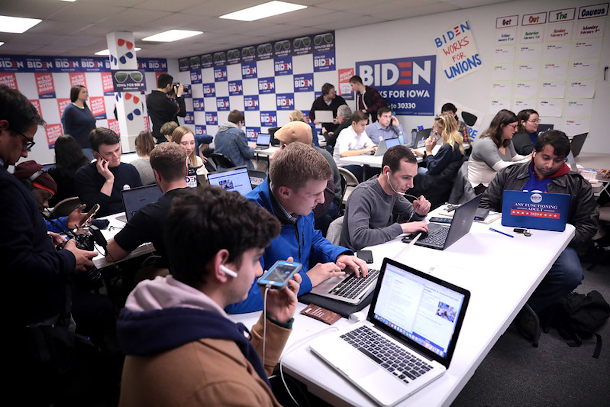
Supporters at a phone bank at Joe Biden's presidential campaign office in Des Moines, Iowa. (Photo: Gage Skidmore, Flickr, CC BY-SA 2.0)
CURWOOD: John Kerry is former Secretary of State and cochair of candidate Joe Biden's climate task force. Thanks so much for taking the time with us today, Mr. Secretary.
KERRY: My honor to be with you, thank you so much. Appreciate it.
Related links:
- Read about Joe Biden’s climate plan
- About the Biden-Sanders Climate Change Task Force
- Listen to our primary campaign coverage of Biden on climate
- Learn more about World War Zero
- ICYMI: Our extended interview with John Kerry on his memoir “Every Day Is Extra”
[MUSIC: The Blind Boys of Alabama, “Jesus Gonna Be Here” on Spirit Of the Century, by Tom Waits, Real World Records]
CURWOOD: Coming up – beavers! they are back in England after being eradicated some 400 years ago. That’s just ahead on Living on Earth.
ANNOUNCER: Funding for Living on Earth comes from you, our listeners, and United Technologies, combining passion for science with engineering to create solutions designed for sustainability in aerospace, building industries, and food refrigeration.
[CUTAWAY MUSIC: Geoff Muldaur’s Futuristic Ensemble, “Davenport Blues” on Private Astronomy: A Vision Of the Music Of Bix Beiderbecke, by Bix Beiderbecke/arr.Geoff Muldaur, Deutsche Grammophon/Edge Records]
Black Lung and COVID-19
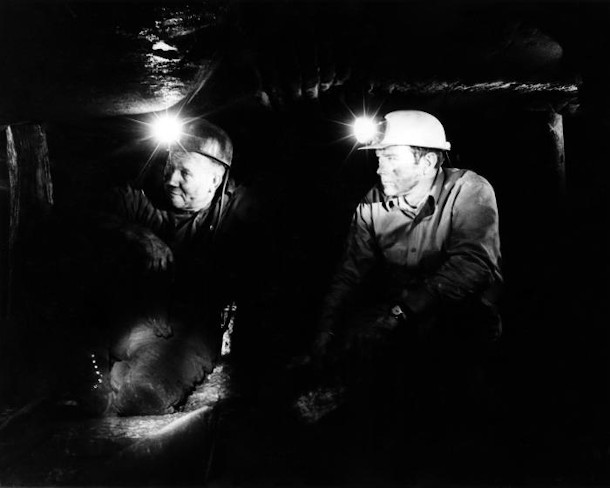
Two coal miners crouched with headlights in their helmets. Black lung disease comes from an accumulation of coal dust, and it was the first described lung disease in coal miners. (Photo: Barbara Jenkins, CDC/NIOSH, Flickr, Public Domain 1.0)
CURWOOD: It’s Living on Earth, I’m Steve Curwood.
Climate change is a major threat to planetary health, and the people who work in the extraction of fossil fuels face have even more risks to personal health. Consider the coal miners who get black lung disease over years of working in the mines. It’s incurable and now during this time of the corona virus pandemic, black lung disease patients are especially vulnerable. Caitlin Tan of West Virginia Public radio has this report from the coalfields.
TAN: Jerry Coleman worked for 37 years, mostly underground, near Cabin Creek, West Virginia. A third generation miner. But at 68 years old, he has complicated black lung disease, meaning, his lungs are permanently and irreversibly scarred by coal dust.
COLEMAN: Black lung, it doesn’t get better, it gets worse.
TAN: Black lung is in a way, a death sentence — the lungs gradually deteriorate until the person can no longer breathe. And in the middle of a pandemic, it is only more complicated, Coleman said. He is also the president for the Kanawha County Black Lung Association.
COLEMAN: You gotta wear a mask, and with your breathin’ problems and stuff, it’s hard to walk around and breath through the mask. It’s like sucking in hot air, But I don’t have no choice, with the condition of my lungs and stuff, I can’t take a chance.
TAN: COVID-19 is classified as a respiratory virus. It can affect and even be deadly to the healthiest of people, but the most vulnerable are those with high-risk conditions, such as lung disease and old age — which represent much of West Virginia’s former coal miner population.
WERNTZ: Each different lung disease kind of takes away some of your lung function.
TAN: That’s Carl Werntz an occupational medical specialist who gives black lung exams, a crucial step to apply for federal black lung benefits.
WERNTZ: So that person if they get COVID it bothers their lungs, They’re going to run out of usable lung much faster than somebody who starts out with healthy lungs.
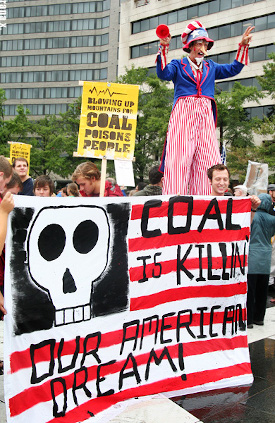
A 2010 Appalachia Rising protest against the coal mining industry. (Photo: Rana Xavier, CDC/NIOSH, Flickr, Public Domain 1.0)
TAN: Since the pandemic began, Werntz said black lung exams were put on hold at the clinic he works at in Cabin Creek. Exams slowly resumed in July, but at half capacity. Typically, he sees six to eight patients a day, but with new COVID protocols, Werntz said he sees three to four — creating a backlog of patients waiting for their black lung exam.
WERNTZ: The longer you wait to do the testing to show that they really have the disease, the longer it is until they can get the benefits, including, you know, potentially medical care if they don’t have some other way to pay for their breathing care.
TAN: Federal black lung benefits include monthly payments and medical coverage for lung treatment – treatment that is expensive, said Jerry Coleman, the former coal miner with black lung. The fight for benefits can be long even without a pandemic. Coleman said he fought for seven years to receive his benefits.
COLEMAN: Until you get awarded it, anything that pertains to you breathing, you have to pay for everything, and you’re not going to, you know, spend exactly what you have to spend, because you don’t have the money to waste. You know? It’s a shame to say but that’s the way it is.
TAN: With COVID severely limiting the number of patients who can come in for their black lung exams, the wait to get benefits keeps growing for some miners. Mickey Pettry, is 63 years old, and he worked in the coal mines much of his life. And although he has been diagnosed with black lung, he’s been fighting for his federal benefits for three years, and now with a pandemic that has politicians scrambling, Pettry says everything is on hold.
PETTRY: The entire focus is on the battle going on up in DC. So, there’s very little attention being paid to anything else.

A former coal miner who became a black lung victim in 1972. (Photo: NARA/EPA via pingnew, Flickr, Public Domain 1.0)
TAN: In fact, the coal excise tax, which is the primary money for the Black Lung Disability Trust Fund, is set to expire at the end of this year. This means funds for black lung benefits could dry up quickly. This issue is a priority for black lung advocacy associations, said Coleman. He and other members from local associations went to D.C. last year and helped secure the funding through 2020. But with COVID, Coleman said it is harder for the associations to hold meetings and to advocate for the renewal of the legislation.
COLEMAN: Because our voice is what’s gotta be heard, you know, If we don’t speak out, it’s gonna be forgotten.
TAN: In the meantime, things are a lot less social for those with black lung disease. Coleman said he has spent most of his spring and summer at home, trying to social distance. Pettry added that not being able to go to the monthly black lung association meetings takes a mental toll. Many of the members are his neighbors, friends or former coworkers. There is a therapeutic aspect. But now, even going to the store is a risk Pettry said.
PETTRY: I don’t have a lot of tolerance for people now. There’s so many people that think wearing a mask is a joke. It’s highly, highly stressful, People have a right to their opinion, but we can’t afford to say that it’s not real. When they infringe upon our protection, you know I get really upset.
TAN: Pettry does not know what the future holds for him as someone with black lung disease during a pandemic, but he said he is making do with what he has — mowing the lawn, grilling meat on his back porch and occasionally putting on a mask and getting a hot chicken sandwich from Chick-fil-A.
CURWOOD: That report from West Virginia Public Radio’s Caitlin Tan.
Related links:
- A link to this story from West Virginia Public Broadcasting
- The Guardian | “‘Black Lung Disease is Killing Miners. The Coal Industry Won’t Hear It.”
- JSTOR | “The Black Lung Miners Who Exposed The Horrors of Black Lungs”
- Learn more about Caitlin Tan from West Virginia Public Broadcasting
[MUSIC: Joshua Messick & Erin Rogers, “Wondrous Love” on Honest: Songs Of Hope, by self-published]
Scylla and Charybdis on the Zambezi River
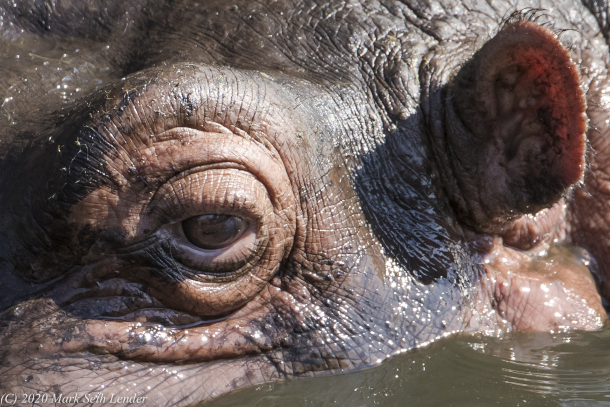
A hippopotamus on the Zambezi River, perhaps too close for comfort. (Photo: (c) Mark Seth Lender)
CURWOOD: The plains of Southern Africa are famous for its wildlife – elephants, buffalo, and hippo to name a few. Living on Earth’s Explorer in Residence Mark Seth Lender shares this story of a close encounter with some of the most dangerous.
Scylla and Charybdis
Hippopotamus & Cape Buffalo
Zambezi River & Hwange National Park
© Mark Seth Lender
All Rights Reserved
Not the thing you want to hear in a narrows.
“HIPPOS ON THE RIGHT!”
Valerie and me we dig in, double stroke, driving up against the bank so hard there’s dirt and leaves and rocks falling into the canoe, listing to twenty degrees, partway on land and too much of the rest of us in the river.
While the hippos continue straight for us.
Not because they want to get us but because they have a point to make:
“This river is my land it isn’t your land if I were you I’d scram for the highlands – ”
When it looks like we are going to make it and just in the nick of time, there on the bank above and only a few strokes away is an extended family of cape buffalo, staring down, and not in a friendly way. The bulls are close enormous solid as hardwood and they are scowling, their horns lowered, heads turned in unison to look across their shoulders, at us; point being the same one the hippopotamus made:
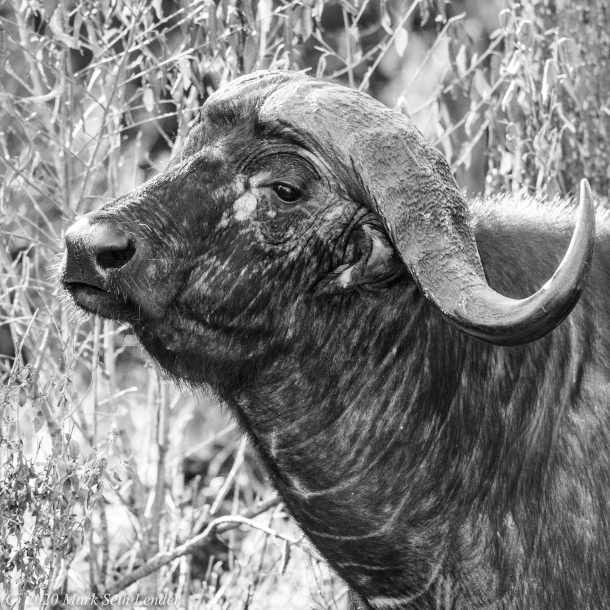
Cape buffalo are known to be strong and dangerous. They can weigh about 2,000 pounds and be about 5 to 6 ft long and 5 to 6 ft tall. (Photo: (c) Mark Seth Lender)
Get your faces out of here!
And you could have water skied behind our canoe that morning on the Zambezi.
Ten days later, we are on foot in Hwange with Albert Paradzai (one of the best guides we have ever had on any continent) and he says in a marvelously normal tone of voice, “Folks there’s danger behind us.”
This time, elephants. They don’t have it in for us (not like the hippos did) but they are thirsty, and in a hurry, thinking only about reaching the nearby waterhole, and we are standing in the way.
And in front of us?
Cape buffalo. An entire bachelor herd, fifty at least, maybe sixty. They stop and stare the way the first ones did, over their shoulders, heads lowered (Mack trucks on hooves) and nothing but flat ground between them and us. We crowd so close together we are practically in the same set of boots. And instead of leading us to safety (not that there is anywhere safe to go) Albert grabs his rifle in both hands, raises it over his head like in the movies when the platoon is about to ford a stream that everyone knows is probably mined, and smiles, and says, “We can’t just leave without saying hello!”
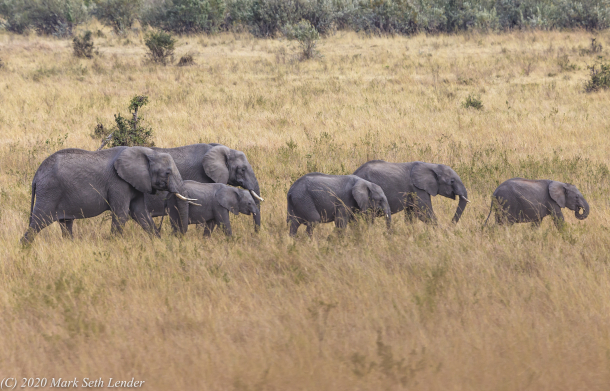
Elephant herd heading for water. (Photo: (c) Mark Seth Lender)
And he runs straight toward them and what the hell are we going to do except follow. Into the Whirlwind.
To our amazement, the herd parts, like Albert is Moses and they are the Red Sea, and they run away.
And stop.
And look. A lot less sure of themselves, this time.
“They think I have a bigger set of horns,” Albert says, meaning the rifle, “and they find that verrrry scary.”
And takes another run at them.
How frequently in life we fear when there is no need, and ignore what should scare us.
CURWOOD: That’s Living on Earth’s Explorer in Residence Mark Seth Lender.
Related links:
- Learn more about Mark Seth Lender's stories and adventures
- Learn about Destination: Wildlife
[MUSIC: Oliver Mtukudzi, “Wasakara” on The Oliver Mtukudzi Collection – The Tuku Years, by Oliver Mtukudzi, Putumayo World Music]
Beavers Return to England
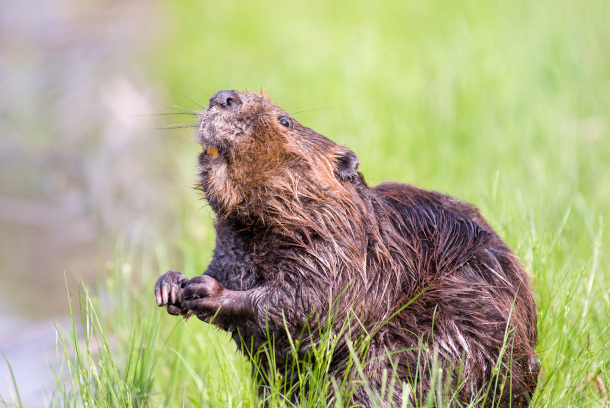
Beavers have been shown to help purify water systems. (Photo: Steve Raubenstine, Pixabay)
CURWOOD: The Eurasian beaver is native to the British Isles but was hunted to extinction some 400 years ago. But not long ago a beaver family mysteriously turned up on a river in Devon, England, prompting concerns about disease and flooding from beaver dams. Some scientists were able to persuade the UK government to allow the beavers to stay as part of a reintroduction pilot plan and recently confirmed that it’s working. Professor Richard Brazier is a hydrologist at the University of Exeter and spoke with Living on Earth’s Jenni Doering.
DOERING: So it sounds like these beavers are here to stay. What made this trial a success?
BRAZIER: Yes, that's correct. The government has allowed the animals to remain not just remain actually but also to expand. We learn a multitude of different things in this really intensively farmed lowland catchment setting, we learned that the beaver dams could reduce the impact of flooding downstream, we learned that the dams could filter pollutants out of the water. We learned, of course, that the animals in bringing water and creating wetlands to these otherwise dry and drained landscapes that they bring more life so that they bring biodiversity back. So there's a whole range of key findings, which, on balance, certainly demonstrate that the benefits of having beavers back in this landscape far outweigh the costs associated with managing them.
DOERING: Right. I mean, I know that beavers have been gone from England for almost or more than 500 years. So I'm wondering, what do you think the landscape has lost in all of those centuries of no beavers on rivers?
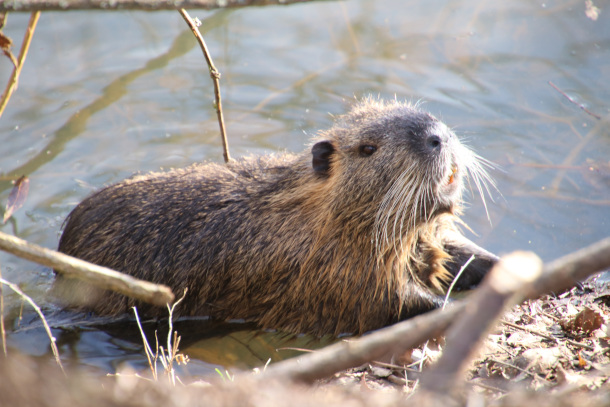
After beavers were released in Devon, vegetation flourished. (Photo: miloszelezny, Pixabay)
BRAZIER: Well, it's lost a very efficient water resource manager in the beaver. And therefore, it's lost a lot of water. And in fact, for the last few months, we have pretty dry weather conditions at this time of year. And during those times a lot of our small streams and tributaries, agricultural ditches, they just run dry. There's very little water left in the soil. There's very little water recharging our groundwater aquifers, there's very low base flow in our streams and rivers. And of course, when you lose that water, you tend to lose all the aquatic life all the aquatic ecology that depends upon it. So in bringing the beavers back, and now there's 15 colonies, 15 family groups of these animals in the River Otter, we're seeing water coming back into what were wetlands these low, low valley floodplains. And it's an amazing thing to see because the landscape transforms even in just a few years into a wetland, wildlife rich water resourceful landscape again.
DOERING: Wow. So what is the river or the streams themselves? What do they look like once beavers move in and start building their dams? How do they change?
BRAZIER: Well, yeah, they look very different. I mean, we tend to, in fact, for hundreds of years, we've we've straightened our streams and rivers, we've deepened them, we've even dredged them. And you know, we've done so to accelerate the drainage of water off our farmland when the beavers come back here. And of course, they they're well known for building dams. And so they start to push the water sideways back onto floodplains, they start to put meanders back into streams and rivers, they start to coppice the trees like willow, sallow hazel. And so we get abundant vegetation flourishing again. They bring big trees down and open up the gaps in the canopy so that we've then got more light coming down to the understory, the plants that grow near ground level. And what they bring, therefore, is variability instead of straight over deep and narrow channels. We get a whole range of different channel shapes, and all the associated return of vegetation with that variability. So yeah, that's something we as humans managed out of the landscape, refining the beavers bring it back very quickly.
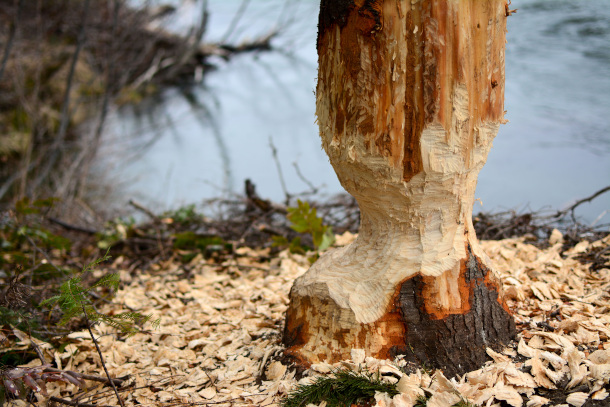
A tree gnawed by a beaver. (Photo: martinvickery, Pixabay)
DOERING: And how much have these beavers on the River Otter in the Devin area, how much have they cleaned up the water?
BRAZIER: Unfortunately, most of the lowland streams and rivers in England, they hold a fine drape a fine layer of sediment above the bed of the stream, which is soil that's left on agricultural fields. When the beavers build dams, they capture that soil. And so immediately downstream for 10s of meters, you see these beautiful clean gravels. And water flowing through those gravels is well oxygenated because it's not full of fine sediment. Those clean gravels are so critical as spawning grounds for salmon and sea trout, and yet, they're largely absent in many of our streams and rivers.
DOERING: Hmm, it sounds just beautiful, and maybe a great place to swim. I don't know when a hot day.
BRAZIER: Oh, for sure. In fact, funnily enough, the first time I came across beavers was actually in southern Arizona, down near to Nogales in the San Pedro River. And I went swimming in beaver ponds, because that was pretty much the only place on that San Pedro river in the hot summer that held any water. So that's 20 years ago. Now that's maybe another story, but it just shows you that's a semi arid desert, of course, the Sonoran Desert. And when you get beavers, even in places like that they hold water which yeah, you can use for bathing for sure.
DOERING: And why might beavers be important from an environmental health perspective?
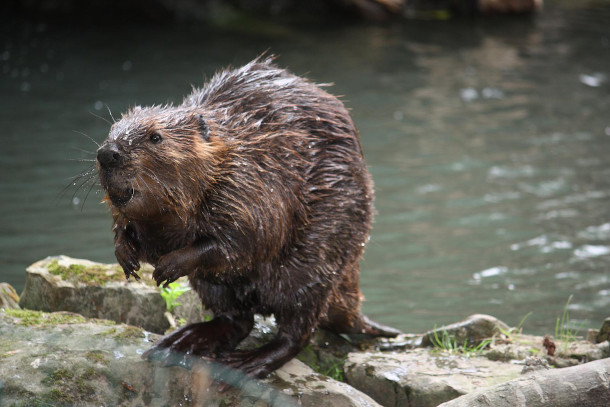
According to Brazier, it only takes a few years for beavers to transform an ecosystem. (Photo: Bryn Davies, Flickr, CC BY-NC-ND 2.0)
BRAZIER: Well, the quality of our water is pretty fundamental to life. I mean, most rivers in the UK waters is obstructed from them for drinking water purposes. We then spent a lot of money treating that water to get it into a pot our state and you know, therefore, if beaver dams in particular can purify the water from a human health point of view, it's in better condition for drinking, it still needs to be treated, of course, but it can be less costly to treat that water if it's cleaner.
DOERING: So before we go, can you share your favorite fun fact about beavers?
BRAZIER: Favorite fun fact. That's a good one. Probably the way in which the female the adult female treats the kids the beaver young, like children is is an amazing thing to see. Her hands if you see up close, they manipulate these young sticks and shoots for the young beavers just like humans, they basically get treated like a little gang of unruly children, much like my own children, I should say, running around, bouncing off each other being shepherded around by the mother. They really are like a little family. And so yeah, I guess that's a neat thing to see.
CURWOOD: Professor Richard Brazier, a hydrologist at the University of Exeter, speaking with Living on Earth’s Jenni Doering.
Related links:
- More about Devon’s beaver reintroduction trial
- Chelsea Green published Bringing Back the Beaver by Derek Glow this week. The book details the movement to rewild Britain with Beavers
[MUSIC: Cacho Tirao, “Chispita” on La guitarra argentina, by Cacho Tirao, Espa Music]
CURWOOD: Living on Earth is produced by the World Media Foundation. Our crew includes Naomi Arenberg, Bobby Bascomb, Paloma Beltran, Jenni Doering, Jay Feinstein, Leah Jablo, Don Lyman, Isaac Merson, Aaron Mok, Aynsley O’Neill, Jake Rego, Casey Troost, and Jolanda Omari. Tom Tiger engineered our show. Alison Lirish Dean composed our themes. Special thanks this week to Destination Wildlife. You can hear us anytime at L-O-E dot org, Apple Podcasts and Google Podcasts, and like us, please, on our Facebook page - Living on Earth. We tweet from @livingonearth. And find us on Instagram at livingonearthradio. I’m Steve Curwood. Thanks for listening!
ANNOUNCER: Funding for Living on Earth comes from you, our listeners, and from the University of Massachusetts, Boston, in association with its School for the Environment, developing the next generation of environmental leaders. And from the Grantham Foundation for the protection of the environment, supporting strategic communications and collaboration in solving the world’s most pressing environmental problems.
ANNOUNCER 2: PRX.
Living on Earth wants to hear from you!
Living on Earth
62 Calef Highway, Suite 212
Lee, NH 03861
Telephone: 617-287-4121
E-mail: comments@loe.org
Newsletter [Click here]
Donate to Living on Earth!
Living on Earth is an independent media program and relies entirely on contributions from listeners and institutions supporting public service. Please donate now to preserve an independent environmental voice.
NewsletterLiving on Earth offers a weekly delivery of the show's rundown to your mailbox. Sign up for our newsletter today!
 Sailors For The Sea: Be the change you want to sea.
Sailors For The Sea: Be the change you want to sea.
 The Grantham Foundation for the Protection of the Environment: Committed to protecting and improving the health of the global environment.
The Grantham Foundation for the Protection of the Environment: Committed to protecting and improving the health of the global environment.
 Contribute to Living on Earth and receive, as our gift to you, an archival print of one of Mark Seth Lender's extraordinary wildlife photographs. Follow the link to see Mark's current collection of photographs.
Contribute to Living on Earth and receive, as our gift to you, an archival print of one of Mark Seth Lender's extraordinary wildlife photographs. Follow the link to see Mark's current collection of photographs.
 Buy a signed copy of Mark Seth Lender's book Smeagull the Seagull & support Living on Earth
Buy a signed copy of Mark Seth Lender's book Smeagull the Seagull & support Living on Earth

